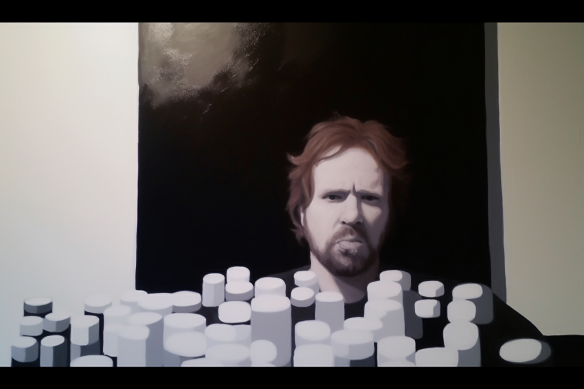“How can I help you today?”
That was the first question my online therapist asked me.
What are we, at a fast-food restaurant? I recall thinking. How can you help me today? Seriously?
After a moment of silence and reflection, I responded, “I’ve been struggling with depression lately and having trouble concentrating at work.”
“Alright, let’s see what we can about that,” Dr. Samuelson said. The doctor was younger than me, about thirty-five with blond hair, and a DO (Doctor of Osteopathic Medicine) rather than an MD. DOs are more “new age” in terms of their medical philosophy than MDs and often recommend preventative/holistic treatments, such as acupuncture and/or massage therapy, to their patients.
My grandfather, an elitist OB/GYN and MD, often said this about this about DOs: “They’re fine for a cold but not much else.”
Although I share a name with my grandfather, I disagree with him about DOs and Dr. Samuelson’s status as a DO is actually one reason I selected her to be my psychiatrist.
Because she was a DO, I figured she’d be less likely to prescribe heavy-duty mood stabilizers for me…
Following our awkward introduction, over the next 35 minutes, Dr. Samuelson and I had a productive dialogue about my mental health background and goals with therapy. For the most part…
At one point I mentioned the fact that I definitely had depression and social anxiety disorder.
“I’ll make the diagnoses,” Dr. Samuelson responded sternly.
I silently may or may not have cursed at my therapist, but I ultimately agreed with Dr. Samuelson—she was the one with medical training and only one capable of diagnosing psychiatric disorders. I mean, at the same time, with all due respect to Dr. Samuelson, you don’t need be a doctor to diagnose a head laceration, just like you really don’t need to be a Freudian shrink to diagnose simple depression, but ultimately she was correct.
What’s Wrong with Me, Doctor?
We talked a little more about my potential malfunctions/disorders. After I wrote my book, Love Songs and Suicide, I had a severe breakdown and alienated some of the people closest to me, which led me to believe I might have borderline personality disorder. I’d always had a severe and irrational fear of rejection, one of the hallmark symptoms of the disorder, and I definitely idealize and villainize people sometimes too, another symptom of BPD.

Earlier that week I’d taken two online assessments for BPD, one of which determined it was “likely” I suffered from the condition; the other assessment said I “possibly” had the disorder.
“I don’t think you have borderline personality disorder,” Dr. Samuelson told me.
“Really?” I said.
“People with borderline personality disorder want to be the center of attention.”
“Interesting. I never read about that symptom.”
“I don’t know you very well yet, but I doubt you have that desire—to be the center of attention.”
“No, not at all. The opposite. I seek anonymity more often than not, but I also have a massive fear of rejection. And isn’t that a classic symptom of BPD?”
“Yes, but it’s also a symptom of avoidant personality disorder.”
“I definitely have that.”
“I agree with you.”
Relieved, I concluded Dr. Samuelson was likely correct in her diagnosis—that I did not have BPD. Britney Spears reportedly suffers from BPD, as does a significant percentage of the prison population in the US. My aim isn’t to stigmatize people with BPD, but yeah, I was happy to learn that I did not have the disorder.
A Problematic Family History
A little later Dr. Samuelson inquired about my family background. “Is your mom still living?” she asked.
“No, she died by suicide,” I said.
“I’m sorry.”
“It’s okay. It was a long time ago.”
Then we proceeded to discuss my book and the breakdown that followed it. Dr. Samuelson wrote down the book’s full title in her notes—Love Songs and Suicide: A Travel Memoir, Romance, and Tragic Musical Comedy.

My Medication Manager
On the online therapy platform I use, psychiatrists are responsible for little more than medication management. The company hires less expensive therapists (clinical social workers, licensed mental health counselors, etc.) to perform basic therapy for their clients.
“Have you ever been on antidepressants?” Dr. Samuelson asked me.
“Yeah, for five years,” I said.
“Which medications did you take?”
“Paxil primarily, then also Zoloft for a while toward the end.”
“How did those medications work for you?”
“They were effective at first, and I think I needed to be on drugs for a while because I had a pretty severe depressive episode at the age of 20, when I first started using antidepressants. But I was on them for way too long. Eventually they just made me fat and complacent.”
“The one I’m thinking about prescribing for you isn’t linked to weight gain.”
“Which one is that?”
“It’s called Effexor.”
Almost Out of Time
She provided me with some basic information about the drug, its benefits, and side effect profile. In the end I agreed to try the medication. I was profoundly unhappy, and one reason I sought help in the first place was because I thought medication might help improve my mood and ability to focus.
Dr. Samuelson also prescribed an antianxiety drug called hydroxyzine for me and asked me to schedule a follow-up appointment in two weeks.
Next: Therapy Journal 3 -“Your Book Sounds Interesting”
Previous: Therapy Journal 1 – “Broke, Miserable, and Alone”

R. Ross Horton is a writer, editor, and musician based in Palm Coast, FL. Last year he published his first book, Love Songs and Suicide: A Travel Memoir, Romance, and Tragic Musical Comedy. At Lovesong.blog, Ross strives to help people find harmony in a chaotic world. Visit this website’s about page to learn more.

